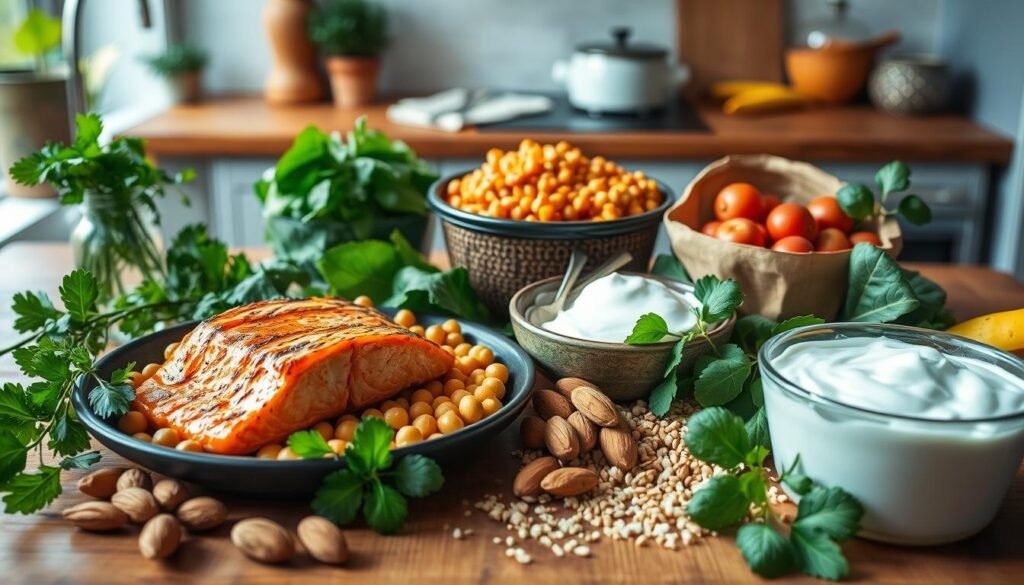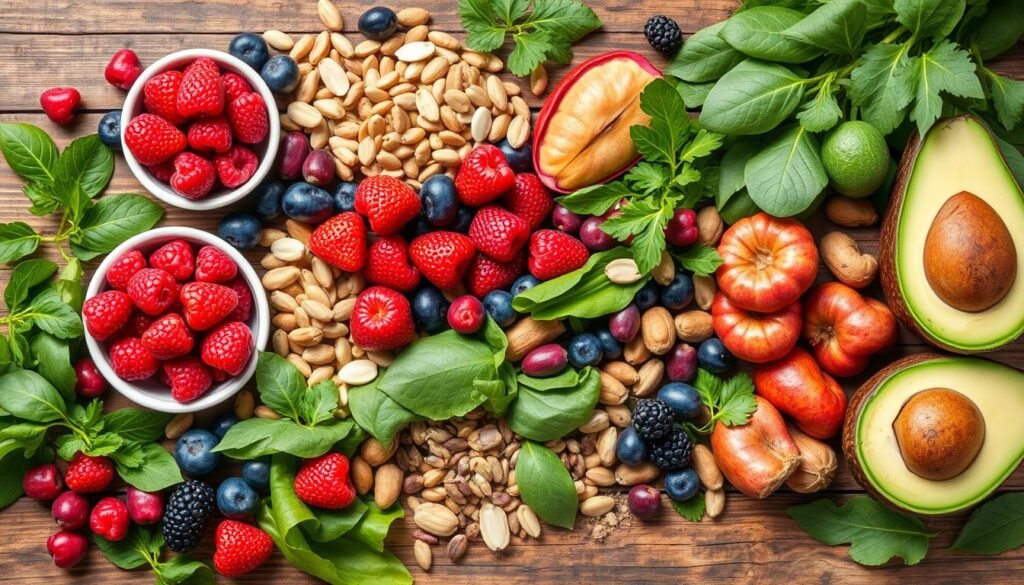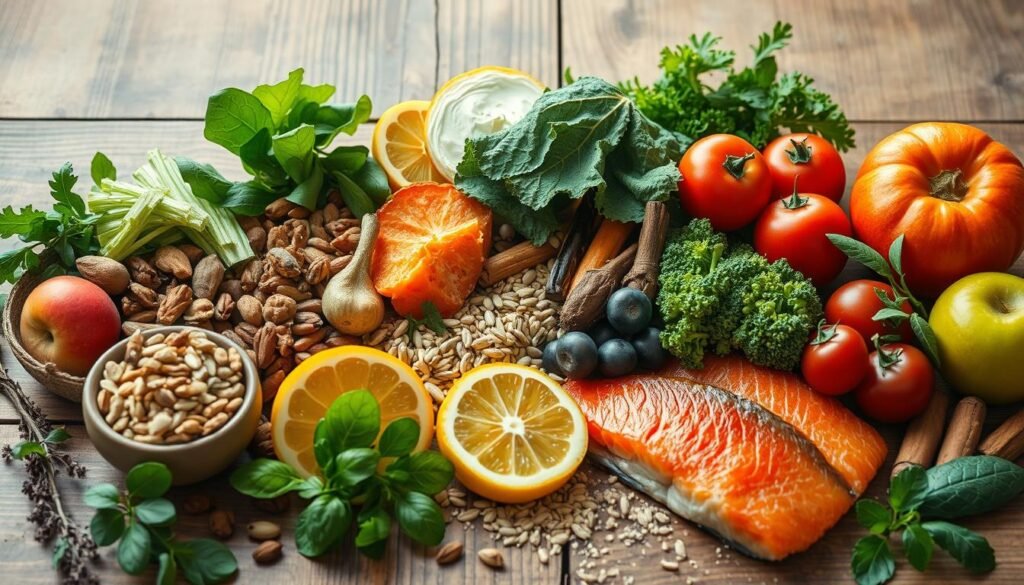This phase is critical for nutritional awareness. Tailored diets help support health and well-being. Menopause affects everything from bones to hormones, making good nutrition essential.
Focus on health diets can ease menopause symptoms. This effort improves comfort and vitality. With the right nutrients, women can feel better overall. Check out meal planning insights for helpful strategies.
Key Takeaways
- Understanding menopause reveals essential dietary needs as women undergo physical changes.
- Incorporating tailored nutrients can help alleviate menopausal symptoms.
- A balanced diet with quality protein is crucial for optimizing health during this phase.
- Hydration and regular nutrition adjustments support overall wellness.
- Meal planning strategies can enhance dietary adherence and relief during menopause.
Understanding Menopause and Its Impact on Women’s Health
Understanding menopause is essential as it marks a big change in a woman’s life. It usually happens between 45 and 55 years of age. It brings many hormonal changes that affect a woman’s health. One common effect is weight gain, as women tend to gain about half a kilo each year during this time.
The change in hormones often leads to more belly fat. This can make up 15% to 20% of a woman’s total body fat after menopause, compared to just 5% to 8% before it. This type of fat increases the risk of heart disease, type 2 diabetes, and some cancers. Menopausal hormone therapy (MHT) can help reduce this belly fat, which is why it’s important to know about it.
Staying active is key to managing the health changes that come with menopause. Women over 50 should aim for 2.5 to 5 hours of moderate exercise each week. Also, getting enough calcium is crucial. Women need 1,300 mg daily to keep their bones strong during this time.
Menopause affects both mind and body. It can strain relationships due to a lowered sex drive. Smoking can also trigger earlier menopause and worse symptoms. By understanding menopause better, women can make healthier lifestyle choices. For more details, check out what we know about.
| Aspect | Before Menopause | After Menopause |
|---|---|---|
| Average Total Body Fat Percentage | 5% – 8% | 15% – 20% |
| Weight Gain Per Year | N/A | Approximately 0.5 kg |
| Calcium Intake Recommendation | N/A | 1,300 mg/day |
| Recommended Physical Activity | N/A | 2.5 – 5 hours/week |
The Importance of Nutrition During Menopause
Nutrition plays a key role during menopause. It helps manage changes as a woman’s hormones shift. Women may deal with hot flashes, mood changes, and sleep issues.
An ideal diet full of nutrient-rich foods boosts health and happiness.
Eating well is crucial for staying healthy. Women face a higher risk of diseases like heart issues and weak bones in menopause. Bad eating habits play a big part in gaining unhealthy weight.
Positive food changes can lower risks linked to low estrogen. Eating fruits, veggies, and good fats helps. Balanced meals maintain bone strength and cut down belly fat.
The Mediterranean diet is known to help with weight and prevent diseases. It’s good for managing menopause symptoms.
To wrap it up, good nutrition during menopause is essential. Making smart food choices helps women feel better during this time.
Essential Nutrients for Menopausal Women
Menopause brings many health changes for women. It’s key to focus on certain nutrients during this time. Calcium, vitamin D, and iron are especially vital. They help keep you healthy and prevent complications. Knowing their benefits and where to find them can guide your diet.
Calcium for Bone Health
As women get older, calcium becomes crucial. They need 1,200 mg daily to keep bones strong and lower osteoporosis risks. You can find calcium in:
- Dairy products, such as milk and yogurt
- Dark leafy greens like kale and broccoli
- Fortified foods, including cereals and plant-based milk
Vitamin D: The Essential Partner for Calcium
Vitamin D is key for absorbing calcium, especially during menopause. Women 51-70 should get 600 IU daily, and those over 70 need 800 IU. To get enough vitamin D, consider:
- Sun exposure, which helps the body produce vitamin D naturally
- Dietary sources, such as fatty fish like salmon and fortified foods
Iron: Why It Matters During Menopause
Iron is still important during menopause because nutrient absorption might decrease. Postmenopausal women should aim for at least 8 mg of iron a day to avoid anemia. For enough iron, try eating:
- Lean meats such as chicken and turkey
- Beans, lentils, and tofu
- Leafy greens like spinach and Swiss chard
Nutrition for Menopausal Women: Key Dietary Changes
Navigating menopause means paying more attention to what you eat. Making the right food choices can help you feel better. They reduce symptoms like hot flashes and improve your mood.
Incorporating More Fruits and Vegetables
A diet rich in fruits and vegetables is key. These foods provide vitamins, minerals, and antioxidants. Aim to eat at least 1.5 cups of fruit and 2 cups of vegetables daily. This can help ease menopause symptoms.
Eating more fruits and veggies can boost your mood and energy. It’s a simple change with big benefits.
Benefits of Whole Grains
Whole grains are important for menopausal women. Options like brown rice, whole wheat bread, and oatmeal are good. They lower your risk of heart disease and some cancers.
Try to have three servings of whole grains each day. They offer fiber for good digestion and weight control. These grains keep you energetic and help manage menopausal weight gain.
The Role of Healthy Fats in Menopausal Nutrition
During menopause, women experience big hormonal changes. These changes affect their health. Adding healthy fats to their diet helps maintain hormonal balance and improve well-being.
Beneficial fats can ease menopause symptoms like hot flashes and weight gain. These fats are good for the heart and can decrease inflammation. Omega-3 fatty acids, found in foods like salmon and seeds, help lower heart disease risk. This is important for post-menopausal women.
Insulin resistance can happen due to hormonal imbalances. It’s important to eat nourishing fats. They help keep blood sugar levels stable.
Adding a range of menopause dietary fats boosts the absorption of vitamins. They also provide energy all day. Examples include:
- Olive oil
- Avocados
- Nuts and seeds
- Fatty fish like mackerel and sardines
Eating healthy fats fights the negative effects of low estrogen. Getting enough monounsaturated and polyunsaturated fats is key. They reduce inflammation and support health during menopause.
It’s crucial to have healthy fats for hormone health. They greatly improve life quality during this phase. Women should include healthy fats menopause in their everyday diet. This helps in easing symptoms and promoting heart health.
| Type of Fat | Source | Benefits |
|---|---|---|
| Monounsaturated Fats | Olive oil, avocados, nuts | Supports heart health, reduces inflammation |
| Omega-3 Fatty Acids | Fatty fish, flaxseeds, walnuts | Reduces risk of heart disease, may lessen hot flashes |
| Omega-6 Fatty Acids | Vegetable oils, processed foods | Should be balanced with omega-3 to prevent inflammation |
Understanding and adding beneficial fats into their diets can help women handle menopause better. They can take a proactive stance towards their health and wellness.
Protein Needs in Menopause: Quality Sources
During menopause, women face challenges that make them need more protein requirements menopause. They need enough protein to keep their muscles strong, their bones healthy, and their energy up. Since muscle mass tends to decrease after 40, women need to eat both animal and plant proteins.
Animal vs. Plant-Based Proteins
Choosing high-quality protein is key in menopause nutrition sources. Animal and plant proteins have unique benefits for menopausal women.
- Animal Proteins: Lean meats, fish, dairy, and eggs are great choices. They give you all the essential amino acids needed to keep muscles strong. For example, a 50-year-old woman who weighs 140 pounds should get at least 53 grams of protein every day to avoid muscle loss.
- Plant-Based Proteins: Beans, lentils, quinoa, and nuts not only give protein but also more fiber and less cholesterol. Eating more veggies can even reduce the chance of early menopause, highlighting the need for varying protein sources in your diet.
Eating 25 to 30 grams of protein with each main meal helps produce muscle protein. For women starting menopause, increasing protein intake and watching calories help keep muscles strong and improve movement. Adding fish and nuts to meals also boosts heart health.

The Importance of Hydration During Menopause
During menopause, keeping hydrated is vital for your health. Hormone changes affect your body, making drinking water very important. It helps reduce hot flashes and dryness.
How Water Affects Menopausal Symptoms
Women should drink six to eight cups of water daily during menopause. This advice comes from a 1945 US Food and Nutrition Board document. Foods like watermelon and celery also add to this daily water amount.
- Setting reminders or using apps can help you drink water regularly.
- Water, herbal teas, and fruit juices are great for hydration.
- Check your pee! A pale straw color means you’re well-hydrated.
Menopause changes how thirsty you feel and how well your kidneys work. This makes it easier to get dehydrated. Drink regularly, especially when active or in the heat. Also, drink less alcohol as it can dehydrate you.
Staying hydrated is key to managing menopause symptoms. Carry a water bottle and keep track of how much you drink. It helps your brain, regulates your temperature, and balances hormones. This makes water crucial for your menopause diet.
Superfoods for Menopausal Wellness
Adding superfoods to daily meals makes a big difference during menopause. These foods are packed with essential nutrients. They help ease symptoms and keep health in check. Notably, soy is a key player, but there are many other foods that support women’s health in menopause.
Leveraging the Power of Soy and Isoflavones
Soy foods are high in isoflavones which act like estrogen. This is great for women dealing with hot flashes and other symptoms. Eating one to two servings of soy daily can bring improvements. Research shows soy helps reduce hot flashes and balances hormones.
Identifying Other Menopause Superfoods
Besides soy, there are many superfoods beneficial during menopause. Let’s look at some of them:
| Food | Key Benefits |
|---|---|
| Fatty Fish (e.g., salmon, mackerel) | Rich in omega-3 fatty acids, which may help regulate hormones and reduce hot flashes. |
| Leafy Greens (e.g., spinach, kale) | Packed with vitamins and minerals, aiding in hormone regulation. |
| Nuts (e.g., almonds, walnuts) | Provide healthy fats and vitamin E, which may alleviate hot flashes. |
| Whole Grains (e.g., quinoa, brown rice) | Support stable blood sugar levels, helping prevent mood swings and energy dips. |
| Fruits (e.g., berries, apples) | Supply antioxidants and essential vitamins to support overall well-being. |
| Herbal Teas (e.g., chamomile, black cohosh) | Known for their calming properties, helping to alleviate stress and hot flashes. |
By adding these superfoods to your diet, you can take a well-rounded approach to menopause health. Focusing on soy and a variety of other superfoods helps maintain hormonal balance. It also boosts overall health during menopause.

Supplements for Menopausal Women: What to Consider
During menopause, women often seek ways to lessen symptoms and stay healthy. A balanced diet is vital, but supplements can plug nutritional gaps. Understanding these supplements helps women make smart health choices in this new phase.
The Benefits of Multivitamins
Multivitamins can be a great addition for menopausal women. They support the health needs of women facing menopause, like fatigue and mood changes. These vitamins pack essential nutrients that might be hard to get from food alone, particularly when eating habits shift.
Calcium and Vitamin D Supplements
Calcium and vitamin D are crucial for menopausal women. Estrogen levels drop, raising the risk of bone loss. Women under 51 need 1,000 milligrams of calcium daily; those over 51 need 1,200 milligrams. Vitamin D helps the body use calcium better. It’s recommended women over 50 take 800 IU of vitamin D daily. Together, calcium and vitamin D keep bones strong and healthy.
| Supplement | Recommended Daily Allowance | Key Benefits |
|---|---|---|
| Calcium | 1,000 mg (up to 51), 1,200 mg (51+) | Maintains bone density and strength |
| Vitamin D | 600 IU (19-50), 800 IU (51+) | Aids in calcium absorption and supports immune function |
| Multivitamins | Varies by formulation | Supports overall health and fills nutrient gaps |
| Vitamin B-12 | 2.4 mcg | Supports nerve function and energy production |
| Vitamin B-6 | 1.3 mg (19-50), 1.5 mg (51+) | Beneficial for mood regulation |
Talking to a healthcare provider before starting supplements is crucial. This ensures choices are personalized to your health needs. An informed approach to supplements can help manage menopause better.
Nutrition Tips for Menopause Management
During menopause, eating right is key. Focus on foods that keep you healthy and ease symptoms. It helps to know which foods to avoid because they make things worse. Things like caffeine, alcohol, and spicy foods can trigger symptoms like hot flashes.
Avoiding Trigger Foods
Reducing trigger foods can make you feel better. Keeping a diary of what you eat helps identify what bothers you. Eating lots of fruits, veggies, lean meat, and grains can help balance your hormones.
Meal Planning and Preparation Strategies
Planning your meals can make eating healthy easier. By preparing meals ahead, you’re less tempted by junk food. Try to:
- Plan weekly meals that are diverse and nutritious.
- Read food labels to choose the best options.
- Make healthy snacks in advance to prevent snacking on bad foods.
- Try new recipes with ingredients like soy and whole grains.
These steps help with menopause and lead to a healthier life. For tips on dealing with tiredness after meals, check out this resource.

Conclusion
Understanding menopause is key for women as they go through this change. Every year, 1.5 million women face menopause. It’s important to see how much it affects their health and happiness. Talking about what to eat helps ease symptoms and make life better. When hormones change, women need to eat differently, focusing on their health.
Nutritional steps can help women handle menopause symptoms and stay healthy. Eating foods rich in calcium, vitamin D, and healthy fats is important. These nutrients keep bones strong, balance hormones, and help with keeping a healthy weight. Drinking plenty of water and sometimes taking supplements can also help. This can improve how women feel, both emotionally and physically, and lower the risk of obesity and metabolic problems.
Starting healthy eating habits is crucial as women go through menopause. Making smart food choices helps women deal with menopause better. It improves their lives. By choosing whole foods and foods full of nutrients, women can manage menopause well. This leads to a healthier future.